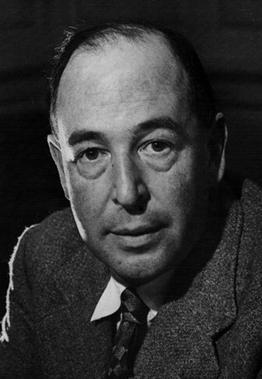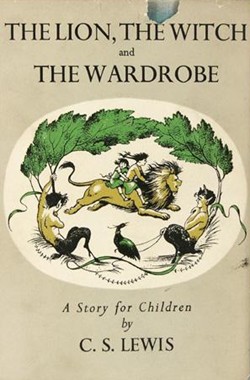Finding Truth in the Wardrobe and Other Unlikely Places
July 24, 2025

C.S. Lewis Devotional No. 2: Finding Truth in the Wardrobe and Other Unlikely Places
What is true? It is a question we are presented with daily, yet we rarely give much thought to it. How do we discern what to believe, and what criteria guide our acceptance of one argument over another?
One might not consider such a subject appropriate for a children’s story, but for C.S. Lewis, it was precisely the ideal starting point. As I write this, I find myself in East Belfast, standing before a replica of the famous Narnian wardrobe – a hidden gateway to another world, tucked away in plain sight within an old house not far from here.
 To be specific, in the story of The Lion, The Witch and the Wardrobe, four children were sent from London to the home of a professor in the rural countryside to escape bombings in London. The house was old, musty, full of books, nooks and crannies. As they explored the house, Lucy, the youngest of the four Pevensie children, discovered a wardrobe. As a child might, she stepped inside the wardrobe, and it seemed bigger than she had expected. As she pushed around, instead of coming to the end of this piece of furniture, she found that she was pushing through some evergreen trees, and before she knew it, she found herself in a forest amid winter! Edmund, her mischievous brother, followed her into the wardrobe. And thus, Lewis’ Narnian adventures began.
To be specific, in the story of The Lion, The Witch and the Wardrobe, four children were sent from London to the home of a professor in the rural countryside to escape bombings in London. The house was old, musty, full of books, nooks and crannies. As they explored the house, Lucy, the youngest of the four Pevensie children, discovered a wardrobe. As a child might, she stepped inside the wardrobe, and it seemed bigger than she had expected. As she pushed around, instead of coming to the end of this piece of furniture, she found that she was pushing through some evergreen trees, and before she knew it, she found herself in a forest amid winter! Edmund, her mischievous brother, followed her into the wardrobe. And thus, Lewis’ Narnian adventures began.
When Lucy and Edmund returned to the “real” world through the wardrobe, their two older siblings, Peter and Susan, wanted to know where they had been. Lucy and Edmund told quite different stories. Lucy simply told what she had seen and experienced. Edmund, not wanting to divulge who he had met, pretended that Lucy was simply making the whole story up. After all, who would ever believe that you could gain access to another world through a wardrobe in an old house? The ensuing argument led to hurt feelings, with Peter and Susan even questioning their sister Lucy’s sanity. To resolve the issue, they visited the professor in whose house they were then residing.
The result was the next morning they decided that they really would go and tell the whole thing to the Professor. “He'll write to Father if he thinks there is really something wrong with Lu,” said Peter; “it’s getting beyond us.” So they went and knocked at the study door, and the Professor said, “Come in,” and got up and found chairs for them and said he was quite at their disposal. Then he sat listening to them with the tips of his fingers pressed together and never interrupting, till they had finished the whole story. After that he said nothing for quite a long time. Then he cleared his throat and said the last thing either of them expected:
“How do you know,” he asked, “that your sister’s story is not true?”
“Oh, but -” began Susan, and then stopped. Anyone could see from the old man’s face that he was perfectly serious. Then Susan pulled herself together and said, “But Edmund said they had only been pretending.”
“That is a point,” said the Professor, “which certainly deserves consideration; very careful consideration. For instance – if you will excuse me for asking the question – does your experience lead you to regard your brother or your sister as the more reliable? I mean, which is the more truthful?”
“That's just the funny thing about it, sir,” said Peter. “Up till now, I’d have said Lucy every time.”
“And what do you think, my dear?” said the Professor, turning to Susan.
“Well,” said Susan, “in general, I’d say the same as Peter, but this couldn't be true – all this about the wood and the Faun.”
“That is more than I know,” said the Professor, “and a charge of lying against someone whom you have always found truthful is a very serious thing; a very serious thing indeed.”
“We were afraid it mightn’t even be lying,” said Susan; “we thought there might be something wrong with Lucy.”
“Madness, you mean?” said the Professor quite coolly. “Oh, you can make your minds easy about that. One has only to look at her and talk to her to see that she is not mad.”
“But then,” said Susan, and stopped. She had never dreamed that a grown-up would talk like the Professor and didn’t know what to think.
“Logic!” said the Professor half to himself. “Why don’t they teach logic at these schools? There are only three possibilities. Either your sister is telling lies, or she is mad, or she is telling the truth. You know she doesn’t tell lies, and it is obvious that she is not mad. For the moment, then, and unless any further evidence turns up, we must assume that she is telling the truth.”
Susan looked at him very hard and was quite sure from the expression on his face that he was not making fun of them.
“But how could it be true, sir?” said Peter.
“Why do you say that?” asked the Professor.
“Well, for one thing,” said Peter, “if it was true, why doesn’t everyone find this country every time they go to the wardrobe? I mean, there was nothing there when we looked; even Lucy didn’t pretend there was.”
“What has that to do with it?” said the Professor.
“Well, sir, if things are real, they’re there all the time.”
“Are they?” said the Professor; and Peter didn’t know quite what to say.
“But there was no time,” said Susan. “Lucy had no time to have gone anywhere, even if there was such a place. She came running after us the very moment we were out of the room. It was less than a minute, and she pretended to have been away for hours.”
“That is the very thing that makes her story so likely to be true,” said the Professor. “If there really is a door in this house that leads to some other world (and I should warn you that this is a very strange house, and even I know very little about it) – if, I say, she had got into another world, I should not be at all surprised to find that the other world had a separate time of its own; so that however long you stay there it would never take up any of our time. On the other hand, I don't think many girls of her age would invent that idea for themselves. If she had been pretending, she would have hidden for a reasonable time before coming out and telling her story.”
“But do you really mean, sir,” said Peter, “that there could be other worlds – all over the place, just round the corner – like that?”
“Nothing is more probable,” said the Professor, taking off his spectacles and beginning to polish them, while he muttered to himself, “I wonder what do they teach them at these schools.”
Indeed, what do they “teach” in the schools? What do you notice about the professor’s reaction to the children’s story? First, he listens. He treats the concern seriously. How many times as a parent have you pushed aside the question of a child simply because it is coming from a child? He sees this as a teaching moment.
Second, he asks questions rather than providing expected answers: Who is more reliable? Is something “true” only if it happens the same way every time (bias towards science)? How does one experience time? Are other worlds possible? Peter and Susan hoped the professor would simply confirm their conclusion, but he refused. Instead, he made them rethink their understanding of truth in that situation by reconsidering their own reasoning.
Look closely, and you'll easily see the parallels between the professor's dialogue with the children and how we understand the story of Christ. During the Enlightenment, science began to erode Scripture's authority by “explaining away” much of life's mysteries. People were coming to the conclusion that Christ, although a good moral teacher, was little more than that. Christian belief was the misguided commitments of a few uneducated fishermen who weaved a tale that was accepted by the masses in the period after the first century.
Lewis encourages the reader to ask different questions about one’s experience of faith: Is Christ’s resurrection a fairy tale because it only happened once? What about other miracles? Who is more reliable in telling the stories of the first century? What makes the Gospel stories reliable? Is another world possible?
Faith, for Lewis, was not the uncritical acceptance of the biblical story, but the careful examination of God’s work over time through his people and the accumulation of evidence. He believed God’s story to be true, in a similar way to Lucy’s experience and story, because it is reliable, consistent, and provides the best explanation for our existence and our future.
 Imaginative literature, even fantastic children’s stories, can transcend their narratives to ask profound questions. Jesus himself, as recorded in Matthew 11:25, spoke to those grappling with his teachings, declaring, “I thank you, Father, Lord of heaven and earth, that you have hidden these things from the wise and understanding and revealed them to little children.”
Imaginative literature, even fantastic children’s stories, can transcend their narratives to ask profound questions. Jesus himself, as recorded in Matthew 11:25, spoke to those grappling with his teachings, declaring, “I thank you, Father, Lord of heaven and earth, that you have hidden these things from the wise and understanding and revealed them to little children.”
Jesus knew that children more readily set aside ingrained experiences and traditions, opening themselves to diverse understandings of life’s grand story. It was no accident he urged his disciples to let children come to him, for “theirs” was the Kingdom of Heaven. Similarly, in the Narnian stories, it’s the youngest and smallest child, Lucy, who is receptive to the Lion’s voice. As we read Lewis’ works, we should strive to be attentive, in our own lives, to the child that still rests within each of us.